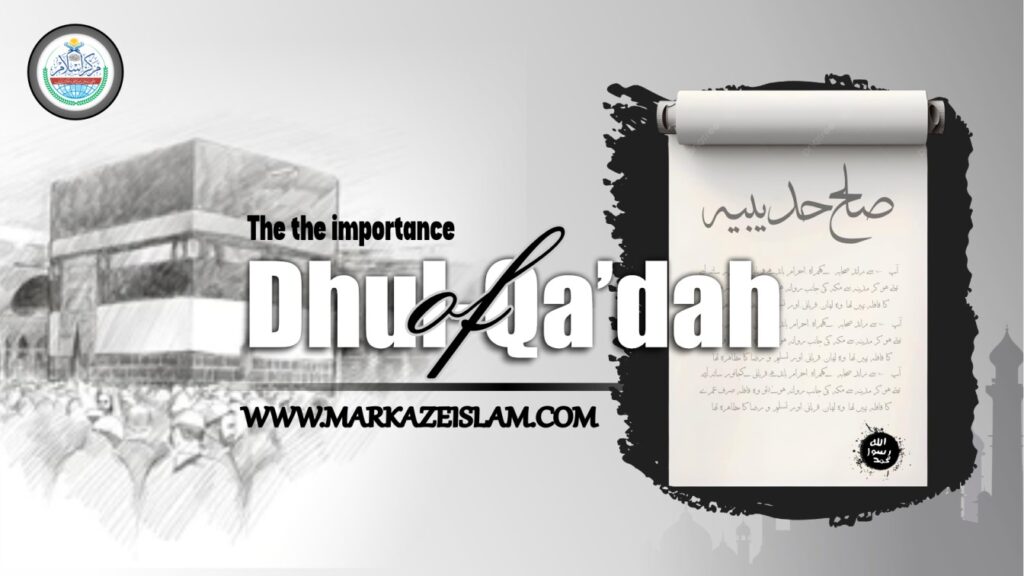Table of Contents
Dhul-Qadah is the eleventh month of the Islamic lunar calendar, and it is considered a sacred and honorable month. Whenever the crescent moon of Dhul-Qa’dah appears, I feel a strange sense of peace descend upon my heart—as if a spiritual stillness is calling out. The word “Dhul-Qa’dah” is composed of two parts: “Dhul” meaning “possessor of” or “the one who has,” and “Qa’dah” meaning “sitting” or “resting.” Thus, the name Dhul-Qa’dah translates to “the month of rest” or “the sitting month,” and honestly, that meaning seems to resonate in the air of this month. It is one of the four sacred months mentioned in the Qur’an and Sunnah: Rajab, Dhul-Qa’dah, Dhul-Hijjah, and Muharram. I’m always amazed to learn that even in the pre-Islamic era of ignorance (Jahiliyyah), people would refrain from warfare during this month so pilgrims could travel peacefully for Hajj and ‘Umrah. Islam not only upheld this beautiful tradition but added spiritual depth to it. Dhul-Qa’dah reminds me that worship is not just an action but a state of being. It is a time for tranquility, spiritual preparation, and reflection—a month where hearts naturally incline towards submission.
Important Events in Dhul-Qadah
Dhul-Qa’dah is among those months declared sacred by Allah Almighty, as mentioned in the verse: “Among them, four are sacred.” Out of the twelve months, Dhul-Qa’dah is the first among the four sacred months.
Treaty of Hudaybiyyah
The Treaty of Hudaybiyyah marks a delicate yet decisive moment in Islamic history. It teaches us how wisdom, patience, and trust in Allah can transform what appears to be a “defeat” into a “clear victory.” The Prophet Muhammad ﷺ saw a dream in which he and his loyal Companions were performing the circumambulation (Tawaf) of the Ka’bah. For me, that dream is always spiritually uplifting—it wasn’t just a vision, it carried a divine message: setting out in the path of Allah, no matter the obstacles. In pursuit of fulfilling this dream, the Prophet ﷺ set out with over 1,400 Companions, all unarmed, in the state of Ihram, bringing sacrificial animals along with them. It was not merely a journey for ‘Umrah—it was a journey of faith, sacrifice, and submission.
The Quraysh resisted their entry into Makkah, diplomatic tensions arose, and rumors spread that Uthman رضي الله عنه—sent as an envoy—had been killed. These events were a severe test for the Muslims. The scene of Bay’at al-Ridwan (Pledge under the Tree) always stirs my heart: the Companions, upon hearing of Uthman’s alleged martyrdom, pledged allegiance to the Prophet ﷺ under the tree, ready to lay down their lives. Amidst this emotional and warlike atmosphere, the Prophet ﷺ chose the path of peace, agreeing to a treaty despite its seemingly harsh and one-sided terms.
For instance: Muslims would not be allowed to perform ‘Umrah that year; if someone from Quraysh came to Madinah, they must be returned, but if a Muslim fled to Makkah, they would not be returned. When ‘Ali رضي الله عنه wrote “Messenger of Allah” in the treaty, the Qurayshi representative objected, and the Prophet ﷺ instructed for the words to be erased. My heart fills with emotion at this moment—such humility, patience, and greatness! The Prophet ﷺ accepted what looked like an apparent loss to prevent bloodshed and preserve peace.
In truth, this “treaty” was the greatest “victory.” It created a peaceful environment for the spread of Islam and opened the door for tribes to draw closer to the message. Just two years later, the conquest of Makkah took place. It was then that the Qur’an declared: “Indeed, We have granted you a clear victory.” (Surah Al-Fath: 1)
Whenever I read this verse, my heart affirms that sometimes, what looks like a loss in the moment is actually the beginning of Allah’s greatest blessings. For me, Hudaybiyyah is not just a historical incident—it’s a timeless lesson in patience, wisdom, and unwavering trust in Allah. It reminds me that there is greatness in humility, and temporary delays can often be steps toward elevation.
Urs (Death Anniversary) of Umm Salamah
The Urs of Umm Salamah رضي الله عنہا took place in the month of Dhul-Qa’dah, in either 59 or 62 AH, in Madinah al-Munawwarah. Umm Salamah, whose real name was Hind bint Abi Umayyah, was one of the earliest and most dignified Muslim women. She not only embraced faith with conviction but also etched her name into history through her sacrifices and unwavering patience. She came from the noble tribe of Banu Makhzum and was known for her eloquence, intelligence, and grace. Her first marriage was to Abu Salamah رضي الله عنه, a close Companion of the Prophet ﷺ. Together, they faced the trials of migration to Abyssinia and later to Madinah with profound steadfastness.
The story of her migration to Madinah still shakes my heart: when her family forcibly separated her from her husband and son, she spent nearly a year crying in the desert with her infant in her arms, yearning to reunite with her family. It was a sight of pain and patience that gives strength to faith and moisture to the eyes. After the passing of Abu Salamah, the Prophet ﷺ married her, and she was elevated to the rank of “Mother of the Believers.” Her wisdom and deep understanding of religion were such that the Prophet ﷺ often consulted her on critical matters. During the Treaty of Hudaybiyyah, when the Companions hesitated to remove their Ihram, it was her insightful advice that helped resolve the situation—a moment that shines as a testimony to her profound intellect. She narrated over 378 Hadith and was especially revered for her guidance on matters concerning women. Her life is a radiant lamp for me—a beacon of knowledge, patience personified, and a soul enriched by the blessed company of the Prophet ﷺ. She passed away in Madinah in 62 AH, leaving behind the legacy of a noble mother for the Ummah.
Fasting in Dhul-Qadah
It is mentioned in a Hadith that whoever fasts even a single day in the month of Dhul-Qa’dah, Allah commands that for every moment of that day, a reward equal to one accepted Hajj and the freeing of one slave be recorded.
In another Hadith, the Prophet ﷺ said to hold this month in high regard, as it is the first among the four sacred months.
Another narration states that one moment of worship in this month is better than a thousand years of worship, and that fasting on Mondays during Dhul-Qa’dah is more virtuous than a thousand years of worship.
(Risalah Fadā’il al-Shuhūr)
Voluntary Prayers (Nafl) in Dhul-Qadah
One Hadith states that whoever offers four rak’ahs of voluntary prayer on the first night of Dhul-Qa’dah, reciting Surah Al-Fatihah followed by Surah Ikhlas 33 times in each rak’ah, Allah will build a thousand ruby palaces for them in Paradise. Each palace will contain thrones made of precious stones, and on each throne will sit a Hoor (heavenly maiden) whose forehead will shine brighter than the sun.
Another narration says that whoever prays two rak’ahs every night during Dhul-Qa’dah, reciting Surah Ikhlas three times after Surah Al-Fatihah in each rak’ah, will be rewarded each night as if they performed one Hajj and attained the rank of a martyr.
Whoever prays four rak’ahs every Friday in Dhul-Qa’dah, reciting Surah Ikhlas twenty-one times after Surah Al-Fatihah in each rak’ah, will receive the reward of Hajj and ‘Umrah.
It is also mentioned that whoever prays 100 rak’ahs on a Thursday in this month, reciting Surah Al-Fatihah followed by Surah Ikhlas ten times in each rak’ah, will receive immeasurable reward.




